Key takeaways:
- Reparations encompass acknowledgment and healing, not just financial compensation, promoting societal justice.
- Effective legislation is crucial for reparations, creating accountability and reshaping public perception.
- Inclusivity and transparency in decision-making and funding are vital for successful reparations initiatives.
- Challenges include differing perceptions of responsibility, bureaucratic complexities, and the need for a universally accepted reparations framework.

Understanding reparations politics
Reparations politics is a complex and often contentious field that delves into the historical injustices faced by marginalized communities, particularly concerning descendants of enslaved individuals. I recall sitting in a community meeting where a heartfelt discussion unfolded about the lingering impacts of slavery. It struck me deeply how the repercussions of such a dark chapter in history extend far beyond the past, affecting lives today.
What does it mean to seek reparations? For many, it’s not just about financial compensation; it’s about acknowledgment and healing. I remember a poignant moment when a friend shared her family’s legacy of oppression and the emotional weight that carries. It made me realize that reparations can also foster a sense of justice and reconciliation, which is vital for societal healing.
Understanding reparations requires us to confront uncomfortable truths and ask ourselves tough questions. Why do some people view reparations as divisive? I often reflect on my own biases, and that self-examination pushes me to appreciate the deeper social dynamics at play. Through these discussions, I find that the journey toward reparations can ignite hope and transformation, sparking a crucial dialogue about equity and justice in our society.
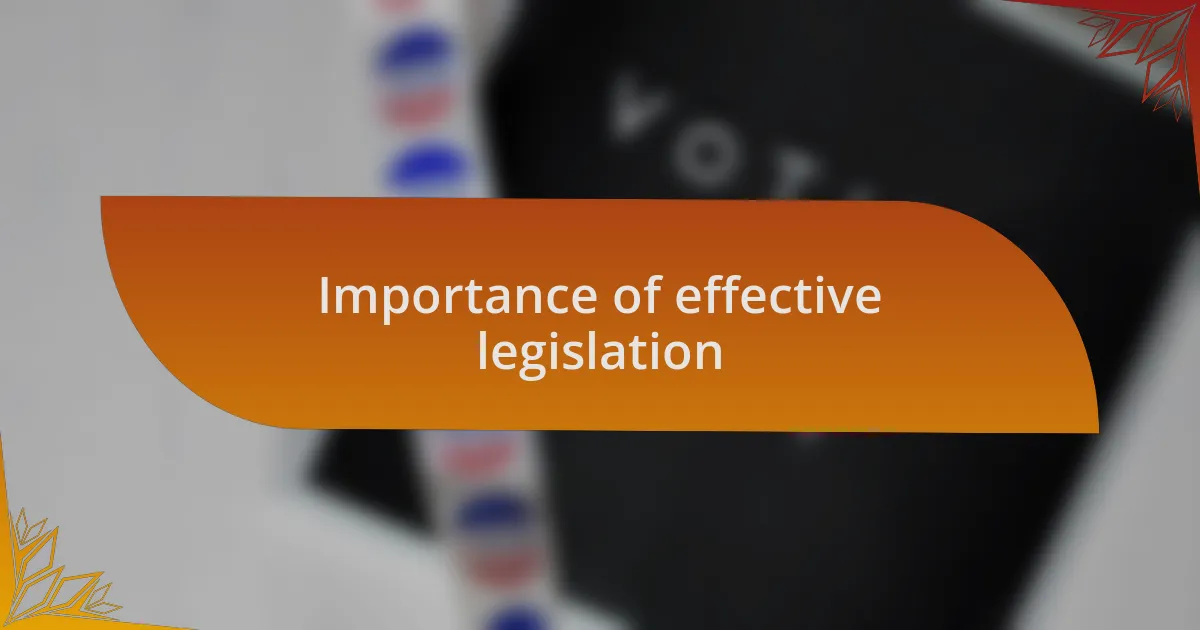
Importance of effective legislation
Effective legislation serves as the backbone of any movement advocating for systemic change. I remember attending a forum where we discussed how nuanced laws can create pathways for restitution. It hit me then that meaningful and well-crafted legislation not only addresses past wrongs but also lays the foundation for a fairer future.
The role of effective legislation is not just to formalize reparations; it’s to create a framework for accountability. I once spoke to a policy maker who shared a story about a community that saw tangible improvements from specific legislative measures. This reinforced my belief that when laws are designed thoughtfully, they empower communities to seek justice and promote healing.
Moreover, the impact of legislation goes beyond the immediate benefits; it can change public perception and foster broader cultural shifts. I find myself often reflecting on how legislative victories can inspire hope among those historically marginalized. Isn’t it fascinating that a single law can not only validate grievances but also serve as a catalyst for societal empathy?
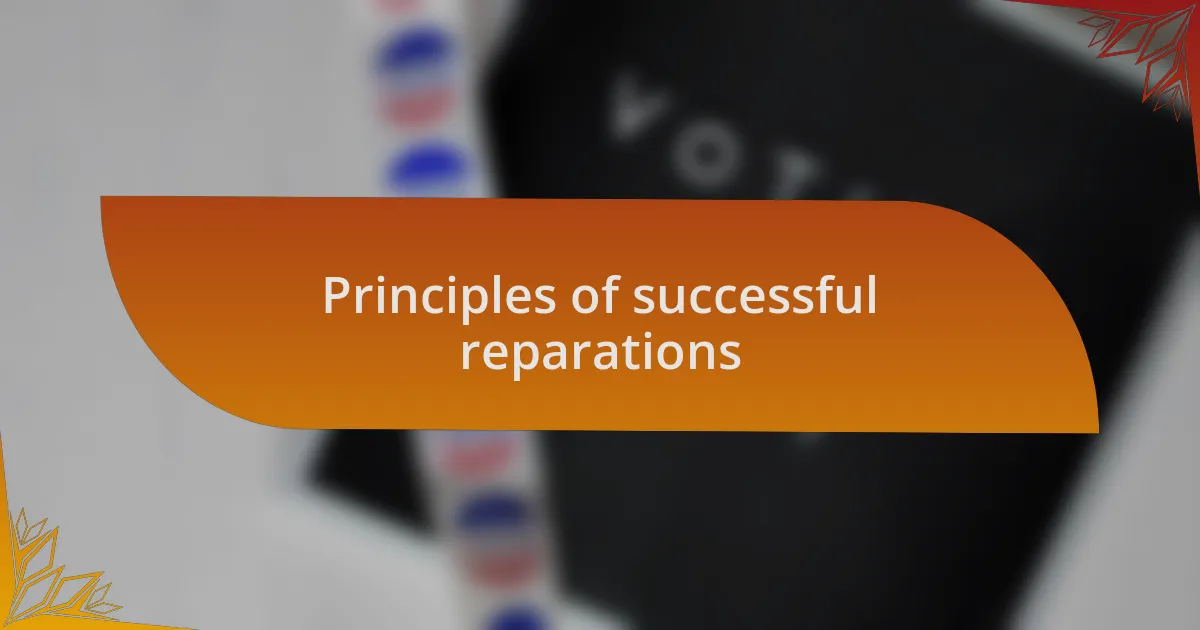
Principles of successful reparations
One principle of successful reparations is the necessity for inclusivity in the decision-making process. I recall a town hall meeting where community members passionately shared their views on what reparations should look like. It made me realize that allowing those affected by injustices to have a voice brings a deeper sense of ownership to the process, ensuring that reparations reflect the true needs and desires of the community.
Another crucial aspect is the transparency in how reparations are funded and allocated. I experienced firsthand the frustration of citizens who felt sidelined by a lack of clarity in government initiatives. This experience taught me that open communication about funding sources and distribution methods not only builds trust but also encourages public support for reparative measures.
Lastly, I believe that ongoing evaluation and adaptability are essential for successful reparations. I was part of a discussion group that reviewed existing reparative programs, and it was enlightening to see how some initiatives succeeded while others faltered due to outdated frameworks. Doesn’t it make sense that to achieve meaningful results, programs should evolve based on feedback and changing needs over time?
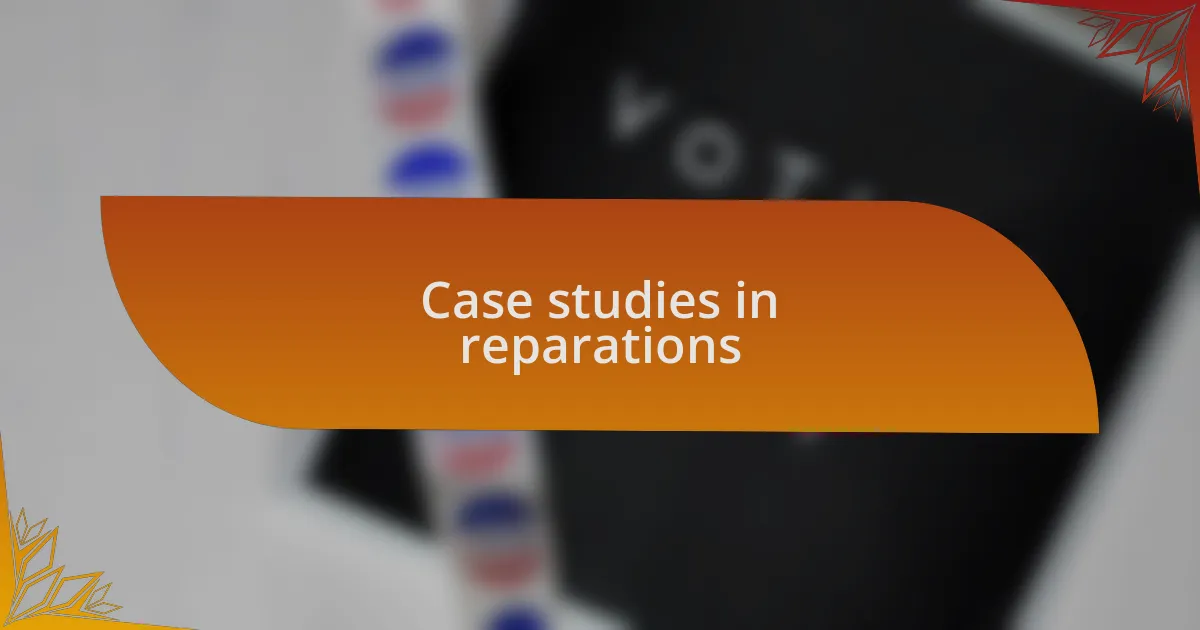
Case studies in reparations
One notable case study in reparations comes from Germany’s response to the Holocaust, where the government established a structured plan for compensation to survivors and their families. I remember attending a seminar where a survivor shared how these reparations not only provided financial support but also recognized the immense suffering endured. It struck me then: isn’t it powerful how reparative measures can also serve as a public acknowledgment of historical wrongs?
In South Africa, the Truth and Reconciliation Commission (TRC) represents a unique approach to reparations by focusing on restorative justice and societal healing. I often reflect on discussions around the TRC, where participants highlighted how sharing personal stories acted as a form of reparative justice, fostering empathy and understanding among previously divided communities. This raises a critical question: can the act of listening and acknowledging pain really pave the way for reconciliation?
Let’s also look at the more contemporary efforts in the U.S., where cities like Evanston, Illinois, have started to implement reparations for Black residents affected by discriminatory housing policies. I was struck by a local event showcasing how community members engaged in discussions about allocation methods. It made me think: as these initiatives unfold, will they inspire other cities to take similar steps, and ultimately create a ripple effect that challenges systemic injustices at a larger scale?
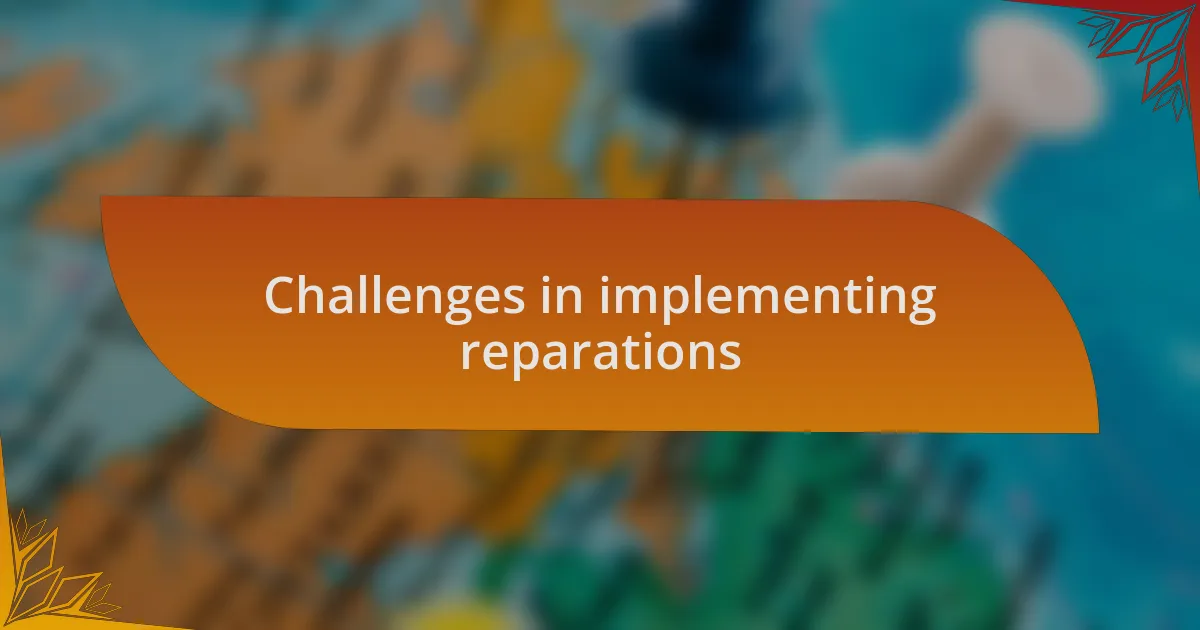
Challenges in implementing reparations
Implementing reparations faces significant challenges, primarily due to differing perceptions of responsibility. During a community meeting I attended, someone passionately argued that reparations suggest guilt on the part of current generations for historical injustices. This sentiment often complicates discussions, as it raises the question: how can we foster understanding between those who feel blame and those who seek acknowledgment and justice?
Another hurdle lies in the bureaucratic complexities of disbursing reparations. I recall hearing a local activist express frustration over the cumbersome processes involved in claiming benefits that should provide immediate support. This raises an important issue: if the mechanisms for reparations are overly complicated, how can we expect affected individuals to access the help they deserve?
Finally, there’s the challenge of establishing a universally accepted framework for what reparations should entail. I remember a lively debate I was part of, where participants couldn’t agree on whether reparations should be financial compensation, community investments, or educational programs. This diversity of opinions leads me to wonder: in a landscape filled with various needs and opinions, how can we create a comprehensive reparations strategy that resonates with everyone impacted?
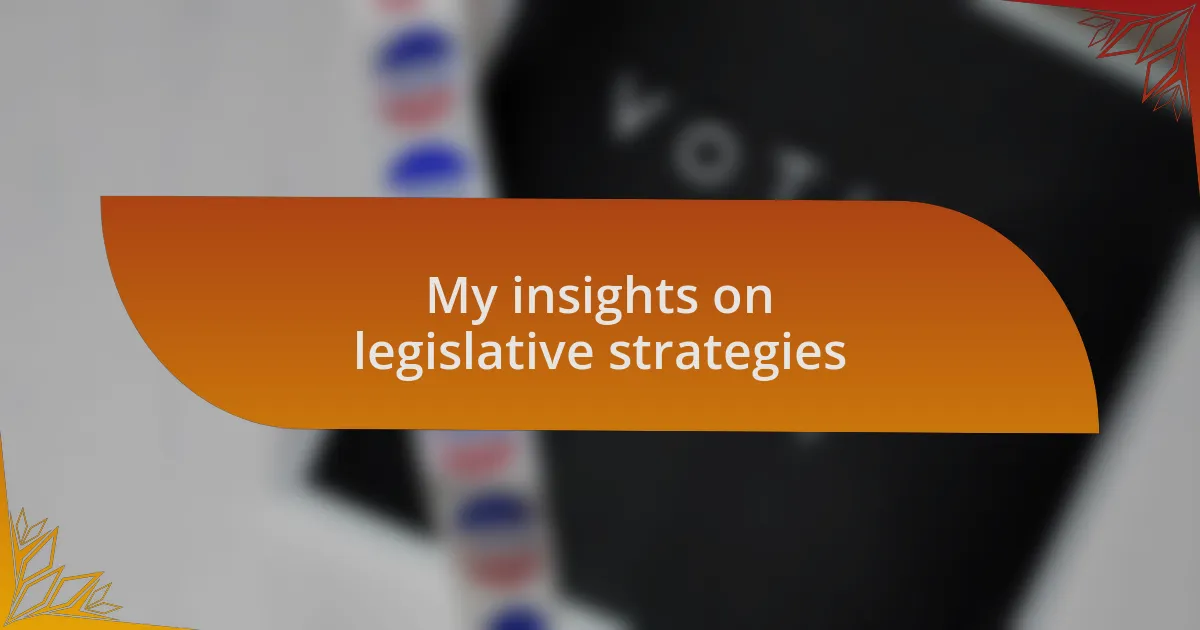
My insights on legislative strategies
When considering legislative strategies for reparations, I believe that community engagement is crucial. I once participated in a town hall meeting where local leaders listened to constituents’ stories about their experiences and the impact of historical injustices. This interaction highlighted how crafting legislation from the ground up can create a sense of ownership and connection. Isn’t it fascinating how those personal narratives can shape policies that feel more relevant and relatable?
Another approach I find effective is the use of pilot programs to test actionable ideas before scaling them. During my time working on a reparation initiative, we launched a small grant program that provided financial support aimed at local businesses owned by descendants of marginalized groups. The feedback and data we collected from participants allowed us to refine our strategy and ultimately gain broader support—proof that trial and error can lead to more robust legislative frameworks.
Lastly, I can’t stress enough the importance of building coalitions. In my experience, aligning with various advocacy groups amplifies our voices and strengthens our message. Recently, while collaborating with different organizations, we discovered shared goals and resources that made our legislative proposals more compelling. Have you ever thought about how collaboration can galvanize a movement? Together, we can strategize more effectively and present a united front, ensuring that the call for reparations resonates and leads to meaningful change.
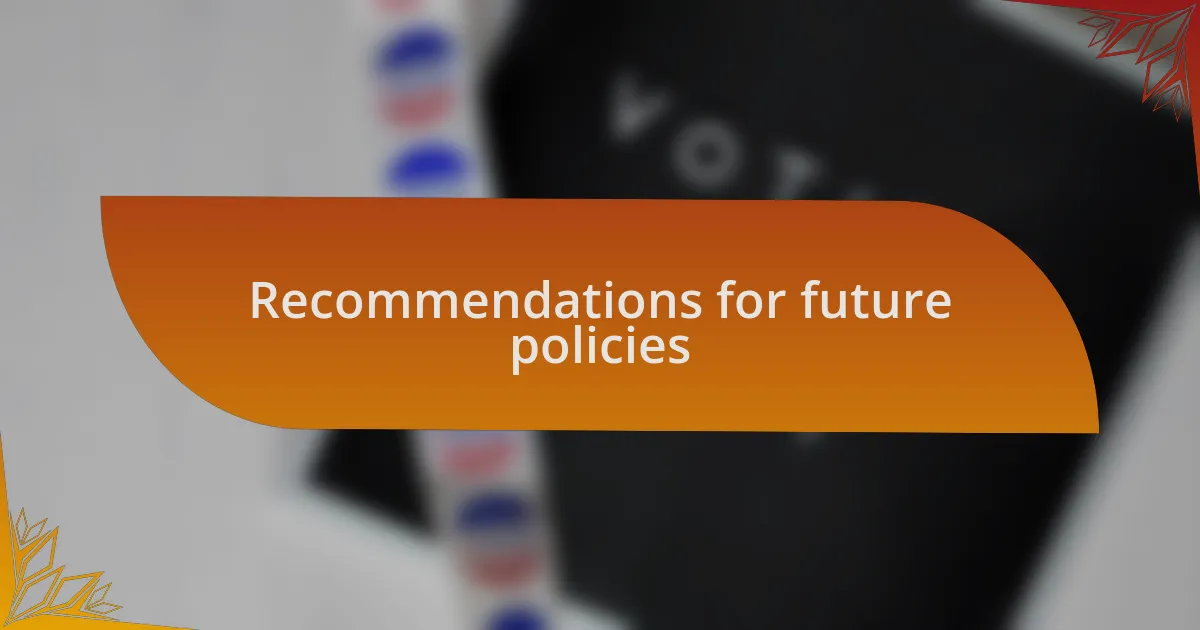
Recommendations for future policies
When considering future policies, I advocate for incorporating educational programs about the history of reparations and systemic injustice. Recently, I attended a workshop that revealed how knowledge can empower communities to advocate for their rights. Isn’t it striking how understanding our history can fuel progress? By embedding these educational elements into policies, we not only inform but also inspire a new generation of advocates.
It’s also essential to prioritize transparency in legislative processes. I recall working on a community-focused project where regular updates were provided to stakeholders, fostering trust and collaboration. When constituents feel informed about the steps being taken, they are more likely to support and engage with the initiatives. Have you ever noticed that a clear line of communication can lead to stronger community involvement? Making policies transparent encourages accountability and strengthens democratic engagement.
Finally, I suggest establishing regular forums for feedback on ongoing reparations efforts. During my early experiences with policy initiatives, I saw firsthand how just a few listening sessions brought critical insights that we hadn’t considered. Engaging the community in an ongoing dialogue allows policymakers to adapt and improve their approaches based on real needs. Isn’t it essential to remember that the voices of those affected should guide these discussions? Keeping channels open ensures that future policies remain relevant and impactful.